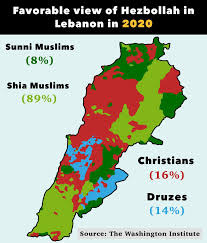Why Lebanon is different from the Palestinian issue
The fight by Iran and Hezbollah is not for justice or self-determination, but an orchestrated campaign of aggression
As tensions escalate between Israel and the Shiite militia Hezbollah, the world community would do well to grasp a fundamental truth: the messy Israeli-Palestinian conflict, which defies moral certitudes and straightforward narratives, should not be conflated with the threat posed by Iran and its jihadist proxies. In the latter arena, Israel is totally in the right as the party that is under attack.
The world often views the Israeli-Palestinian struggle through a lens of historical grievances, and there is a global ennui with what has become a story of squabbling tribes often represented by unappealing leaders pushing maximalist agendas. Despite the deep complexity and tragic history, there are legitimate grievances on both sides.
The Palestinians have long sought self-determination, and though their leadership has often failed them, their efforts are not unjustifiable. Israel has legitimate security concerns and a right to defend itself. Most informed people understand that this is a difficult entanglement.
But on the Lebanon front, Hezbollah’s Iran-driven aggression is of another cast: the marquee element of an unrelenting effort to destabilize the region and expand Iranian influence through violence, terror and a bizarrely effective Islamist gaslighting campaign. Hezbollah’s attacks on Israel are not about land or freedom, even if they have invented a handful of trivial border demarcation disputes in order to bamboozle the gullible. They are not even about the Palestinians, whom Hezbollah claims to be in solidarity with. This is not a fight for justice or self-determination but an orchestrated campaign of aggression.
Hezbollah has been firing rockets, shells and drones at Israel since the day after the Oct. 7 Hamas invasion and massacre, and this has caused over 60,000 Israelis to flee their homes in the north of the country, some of whose towns lie in ruins. Israel has, incredibly, somehow allowed this to continue, hoping counterstrikes and targeted assassinations of Hezbollah leaders — and in the past week, a campaign of exploding pagers and walkie-talkies — will somehow deter the group. But jihadis do not have deterrence as a function — and now there is talk of a ground invasion to push Hezbollah away from the northern border.
Iran’s proxy aggression extends far beyond Lebanon, impacting stability across the entire Middle East. In Yemen, Iran’s support for the Houthi rebels has fueled a devastating civil war, and over much of the past year the group has been impeding global maritime trade through the strategic Bab el-Mandeb Strait, which has severely affected Egypt’s economy due to reduced traffic through the Suez Canal. Iranian-backed Shiite militias in Iraq and Syria continue to undermine fragile post-war recovery efforts while propping up the brutal Assad regime in Syria. Iran’s influence also threatens Jordan’s brittle, pro-Western Hashemite Kingdom.
The West’s reluctance to engage in another Middle Eastern conflict is understandable, particularly after the costly and ultimately futile wars in Iraq and Afghanistan — but it’s still wrong (see the argument below).
Ignoring the threat posed by Hezbollah and Iran is not a viable option. Iran’s ambitions in the region are clear, and its pursuit of nuclear weapons is a ticking time bomb that the world cannot afford to ignore. And in the immediate term, allowing Hezbollah to operate with impunity, and allowing this to be Israel’s problem alone, is a terrible mistake.
For one thing, that is because Israel is unfortunately saddled with an internally divisive right-wing government under Prime Minister Benjamin Netanyahu — one that even many Israelis don’t trust to handle the situation responsibly. That complicates the chances that Israel can maintain the support of its allies, particularly the United States. Military assistance, intelligence sharing, and diplomatic backing in international forums like the U.N. Security Council will be critical.
It is therefore critical that if the fighting does escalate, especially if Israel invades southern Lebanon, it takes great care to ensure the people of Lebanon not suffer for the actions of a terrorist organization that has hijacked their country. Israel must go above and beyond to spare Lebanese civilians, not only because it is the right thing to do, but because the future of Israeli-Lebanese relations depends on it.
Lebanon is not Gaza, and its people, for the most part, are not aligned with Hezbollah’s destructive agenda; that is not exactly true in Gaza, which is more homogeneous, and where Hamas has used its brutal and sole control to try to brainwash the entire population for two decades or so. They deserve a future free from Iranian influence and Hezbollah’s grip — and at peace with Israel (note Hezbollah’s unpopularity in the below 2020 poll by the Washington Institute across the country and in all groups except for Shiites — who are a quarter to a third of the population and among whom Iran largely buys support through jobs and patronage).
It would be better if Israel were made to feel like it does not need to invade Lebanon, and incur the risks of that scenario. And that might still happen if the international community, particularly the United States and Europe, adopted a wholly different approach.
There are powerful tools that could be deployed.
Keep reading with a 7-day free trial
Subscribe to Ask Questions Later to keep reading this post and get 7 days of free access to the full post archives.



